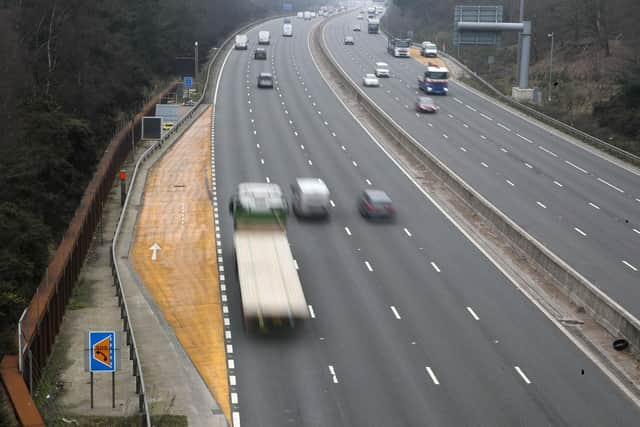Widow of M1 crash victim Jason Mercer blasts 'compromise' as Grant Shapps says all new smart motorways will have radar technology to detect broken-down vehicles
The Cabinet minister also said retrofitting the Stopped Vehicle Detection (SVD) system to the existing network will be accelerated by Highways England
An action plan launched by Mr Shapps in March 2020 included a deadline of rolling out SVD across the entire network by March 2023, but this will now be completed by September next year.


Advertisement
Hide AdAdvertisement
Hide AdThere is growing concern over all lane running (ALR) smart motorways - which involve the hard shoulder being converted into a running lane - due to several fatal accidents involving stationary vehicles being hit from behind.
Fourteen people were killed in 2019 on motorways where the hard shoulder was either permanently removed or being temporarily used as a live running lane, according to Sunday Times analysis.
In a written ministerial statement, Mr Shapps stated: "Great Britain has some of the safest roads in the world and, although per hundred million miles driven there are fewer deaths on smart motorways than conventional ones, we are determined to do all we can to help drivers feel safer and be safer on our roads."
A coroner in Sheffield claimed in January that smart motorways "present an ongoing risk of future deaths" after two people were killed when a lorry driver ploughed into their vehicles while they were stationary on the M1 in South Yorkshire.
Advertisement
Hide AdAdvertisement
Hide AdResponding to the announcement on smart motorways, Claire Mercer, whose husband Jason Mercer died on a smart motorway on the M1 near Sheffield in June 2019, told the PA news agency: "It's all compromises. Nothing is new."
She went on: "Nothing short of giving back the hard shoulder in every single instance will be acceptable."
The Commons' Transport Select Committee is conducting an inquiry into smart motorways, with chairman and Tory MP Huw Merriman warning there are "genuine worries" about the roads.
Steve Gooding, director of motoring research charity the RAC Foundation, said: "We welcome this acceleration in the retrofitting programme.
Advertisement
Hide AdAdvertisement
Hide Ad"Whilst the casualty numbers suggest smart motorways may, overall, be safer than conventional motorways with a hard shoulder, that doesn't mean they can't be safer still.
"Ministers acknowledge a gap remains between what the data suggests about the safety of smart motorways and what the many drivers believe to be the case.
"The numbers mean nothing if it's your car that breaks down and you can't reach an emergency refuge.
"The challenge for Highways England is not just doing the upgrade work but communicating to road users that all lane running requires a different mindset from drivers - only then will they start to turn public opinion around."
Advertisement
Hide AdAdvertisement
Hide AdLast month, Mr Shapps commissioned the Office of Rail and Road to carry out an independent review of safety data for the controversial roads.
He also ordered his officials to continue their work with Highways England - the Government-owned company responsible for England's motorways and major A roads - on "developing possible future options" for reducing accidents on smart motorways.